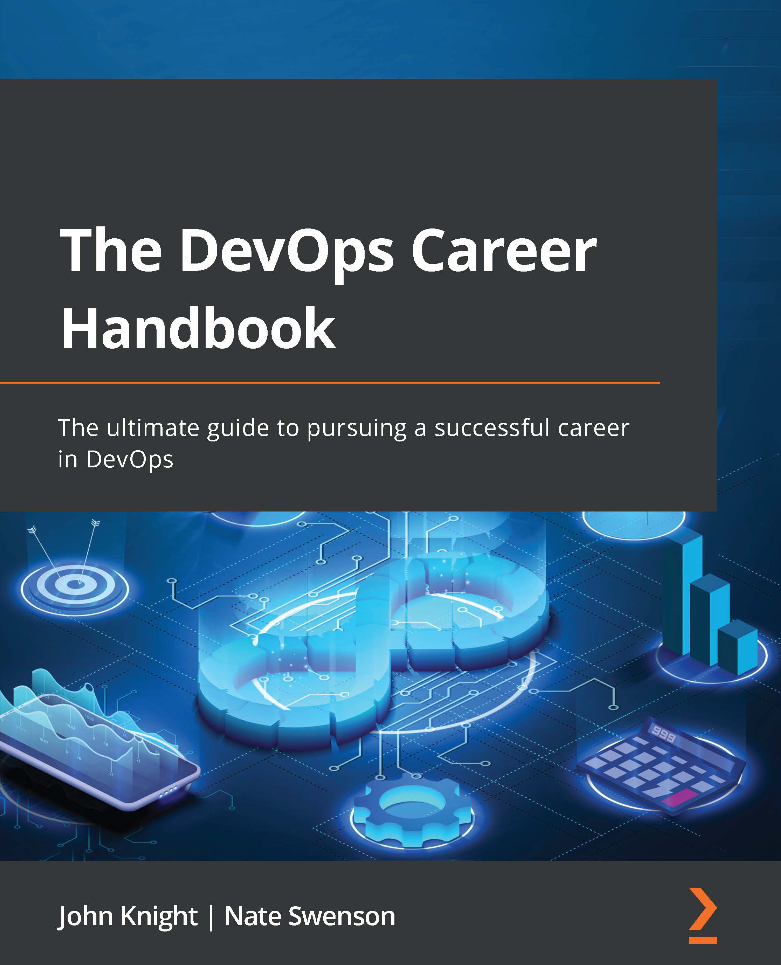Book Review - The DevOps Career Handbook

Last week, I went searching on O’Reilly’s Online Bookstore for DevOps related content. It listed hundreds of books and courses, but after narrowing down my search, I got some good recommendations.
One of them was The DevOps Career Handbook. It is actually a Packt Publication, and I personally find O’Reilly’s and PacktPub’s in-house publications very helpful. The books are pretty well formatted too.
About
The Handbook is basically for DevOps practitioners looking to take the next step in their career, engineers looking for a career switch, managers who want to understand the complete picture of the DevOps landscape, and anyone interested in incorporating DevOps into their tech journey.
The book comes from Nate Swenson & John Knight, who have been in the field of Tech & DevOps for around two decades now. Nate Swenson specifically uses his personal journey as an example to make things understandable, like how his interest in automation and hunger to learn eventually got him a job in DevOps.
The co-author of this book - John Knight turns out to be the first guy whom Nate Swenson interviews in his career.
Book Theme
The book starts with the “Why” of choosing DevOps as a career. Shortly after that it touches the history of DevOps and how it became a thing around 2008 for the first time, when a developer and Agilist met at a conference and decided on a better way of developing software. It also elaborates on the DevOps principles and the numerous career paths to choose from.
It discusses the basic skills required to succeed as an entry-level DevOps engineer, such as CLI, SCM, IaC, scripting, and CI/CD tools. It also elaborates on advanced DevOps roles and the different certifications available in AWS, GCP, and Azure.
There is a dedicated chapter on rebranding, covering how to ensure that you are presented in your best self to potential employers, how to set up a professional LinkedIn profile, and create a personal portfolio. It also discusses how to network with other people both virtually and in real life.
The book emphasizes the important role a mentor plays in one’s career and how we can ask somebody who we look up to for mentorship or how we can find one. It also discusses how to make sure both the mentee and mentor grow trust and respect for each other.
Another section brings up the recruiter’s role, their types, and how to deal with them. It covers how and when to follow up and how to negotiate with recruiters. The importance of proactivity, the proper way of presenting yourself, and being ready to ask questions is also discussed.
In the last half, the authors discuss the interview process, its phases, what to expect, and tricks of the trade. It also lays out a plan for preparation for each distinct phase, ending with some tricks. Each possible interview round is also broken down with instructions on how to tackle them.
Analysis
As a DevOps practitioner, I found this book informative. It provided me with clarity on the different career pathways in DevOps and how each level differs from one another, as well as what it takes to get there. Especially the segregation into Generalist, Specialist & Specializing Generalist.
The fundamental principles with a touch of history also helped me to expand my knowledge on the subject. It answered some of the questions I had related to certifications too. The chapter on branding and building a portfolio is also useful, even though I have already set it up, but I definitely picked up some suggestions on improving my LinkedIn.
The importance of a mentor was brought up and it can’t be stressed enough. There are a few people I am looking up to, but they don’t know me and I’m open if somebody wants to become my mentor.
I also got an idea of the overall interview process and how to tackle it. I picked up many do’s and don’ts besides a bunch of tricks as well. Another thing that was brought up in the book is being honest about what you say about yourself out there because it could sometimes cost a job, and the author was talking from personal experience.
Review
My rating : ⭐⭐⭐⭐
Most of the information in the book was new to me or unclear before reading it. It definitely left me feeling more knowledgeable and better informed than I was previously.
I would recommend this book to any DevOps enthusiast or practitioner who wants to break into DevOps or Cloud. In fact, it is equally useful for newbies who are aspiring developers, as half of the topics discussed in the book would be relatable to them as well.
If you found this post useful consider sharing it with friends & subscribe using RSS or Telegram.
Reply via mail
